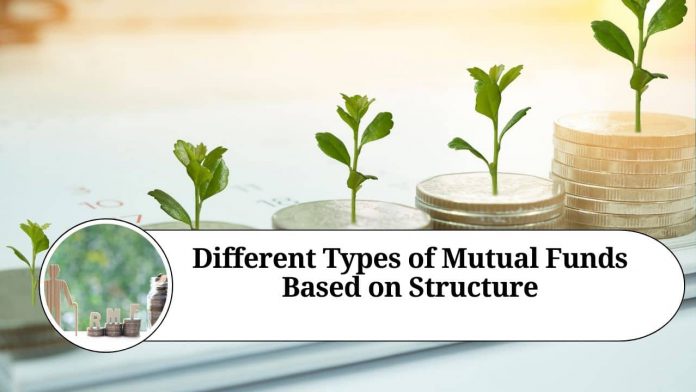Investing in mutual funds has become a popular way for individuals to build wealth over the long term. Mutual funds are investment vehicles that pool money from multiple investors to purchase a diversified portfolio of stocks, bonds, and other securities. One of the most important things to consider when investing in mutual funds is the fund’s structure. In this article, we will discuss different types of mutual funds based on structure.
-
Open-Ended Funds
Open-ended mutual funds are the most common type of mutual funds. These funds allow investors to buy and sell shares at any time at the current net asset value (NAV) of the fund. The NAV is the total value of the fund’s assets minus any liabilities, divided by the number of shares outstanding. Open-ended funds are managed by a professional fund manager who makes investment decisions based on the fund’s investment objective.
-
Closed-Ended Funds
Closed-ended mutual funds have a fixed number of shares that are issued at the time of the initial public offering (IPO). After the IPO, the shares trade on an exchange like a stock. Closed-ended funds are typically actively managed, and the fund manager’s goal is to generate returns for investors by investing in a diversified portfolio of securities. Unlike open-ended funds, closed-ended funds do not issue new shares or redeem existing shares on demand.
-
Exchange-Traded Funds (ETFs)
Exchange-traded funds (ETFs) are similar to closed-ended mutual funds in that they are traded on an exchange like a stock. However, ETFs can be bought and sold throughout the trading day at market prices, unlike closed-ended funds, which trade at a premium or discount to their net asset value. ETFs are typically designed to track a specific index or sector, and they provide investors with exposure to a diversified portfolio of securities.
-
Interval Funds
Interval funds are a relatively new type of mutual fund that combines features of open-ended and closed-ended funds. These funds periodically offer to buy back a limited number of shares from investors at net asset value, typically once a quarter or once a year. The shares are also redeemable at the end of a set period, usually every few years. Interval funds are typically used for alternative investments such as private equity, real estate, or hedge funds.
-
Unit Investment Trusts (UITs)
Unit investment trusts (UITs) are another type of closed-ended mutual fund that invests in a fixed portfolio of securities. UITs issue a fixed number of units, and the units are not redeemable. UITs are typically designed to have a fixed lifespan, usually between 15 and 30 years, after which the securities are sold, and the proceeds are distributed to investors.
conclusion
Understanding the different types of mutual funds based on structure is important for investors who want to make informed investment decisions. Each type of mutual fund has its own set of advantages and disadvantages, and investors should carefully consider their investment goals and risk tolerance before choosing a mutual fund to invest in.
Other Related Blogs: Section 144B Income Tax Act
Frequently Asked Questions (FAQs)
Q: What are open-ended mutual funds?
A: Open-ended mutual funds are investment vehicles that allow investors to buy and sell shares at any time at the current net asset value (NAV) of the fund. These funds are managed by a professional fund manager who makes investment decisions based on the fund’s investment objective.
Q: What are closed-ended mutual funds?
A: Closed-ended mutual funds have a fixed number of shares that are issued at the time of the initial public offering (IPO). After the IPO, the shares trade on an exchange like a stock. Closed-ended funds are typically actively managed, and the fund manager’s goal is to generate returns for investors by investing in a diversified portfolio of securities.
Q: What are exchange-traded funds (ETFs)?
A: Exchange-traded funds (ETFs) are similar to closed-ended mutual funds in that they are traded on an exchange like a stock. However, ETFs can be bought and sold throughout the trading day at market prices, unlike closed-ended funds, which trade at a premium or discount to their net asset value. ETFs are typically designed to track a specific index or sector, and they provide investors with exposure to a diversified portfolio of securities.
Q: What are interval funds?
A: Interval funds are a relatively new type of mutual fund that combines features of open-ended and closed-ended funds. These funds periodically offer to buy back a limited number of shares from investors at net asset value, typically once a quarter or once a year. The shares are also redeemable at the end of a set period, usually every few years. Interval funds are typically used for alternative investments such as private equity, real estate, or hedge funds.
Q: What are unit investment trusts (UITs)?
A: Unit investment trusts (UITs) are another type of closed-ended mutual fund that invests in a fixed portfolio of securities. UITs issue a fixed number of units, and the units are not redeemable. UITs are typically designed to have a fixed lifespan, usually between 15 and 30 years, after which the securities are sold, and the proceeds are distributed to investors.
Q: Which type of mutual fund is the most common?
A: Open-ended mutual funds are the most common type of mutual funds.
Q: What are the advantages of investing in ETFs?
A: ETFs offer investors a low-cost way to gain exposure to a diversified portfolio of securities. They also offer flexibility as they can be bought and sold throughout the trading day at market prices.
Q: What are the disadvantages of investing in closed-ended mutual funds?
A: Closed-ended mutual funds can trade at a premium or discount to their net asset value, and the share price can be influenced by market forces rather than the underlying performance of the fund. They also typically have higher fees than open-ended mutual funds or ETFs.




















